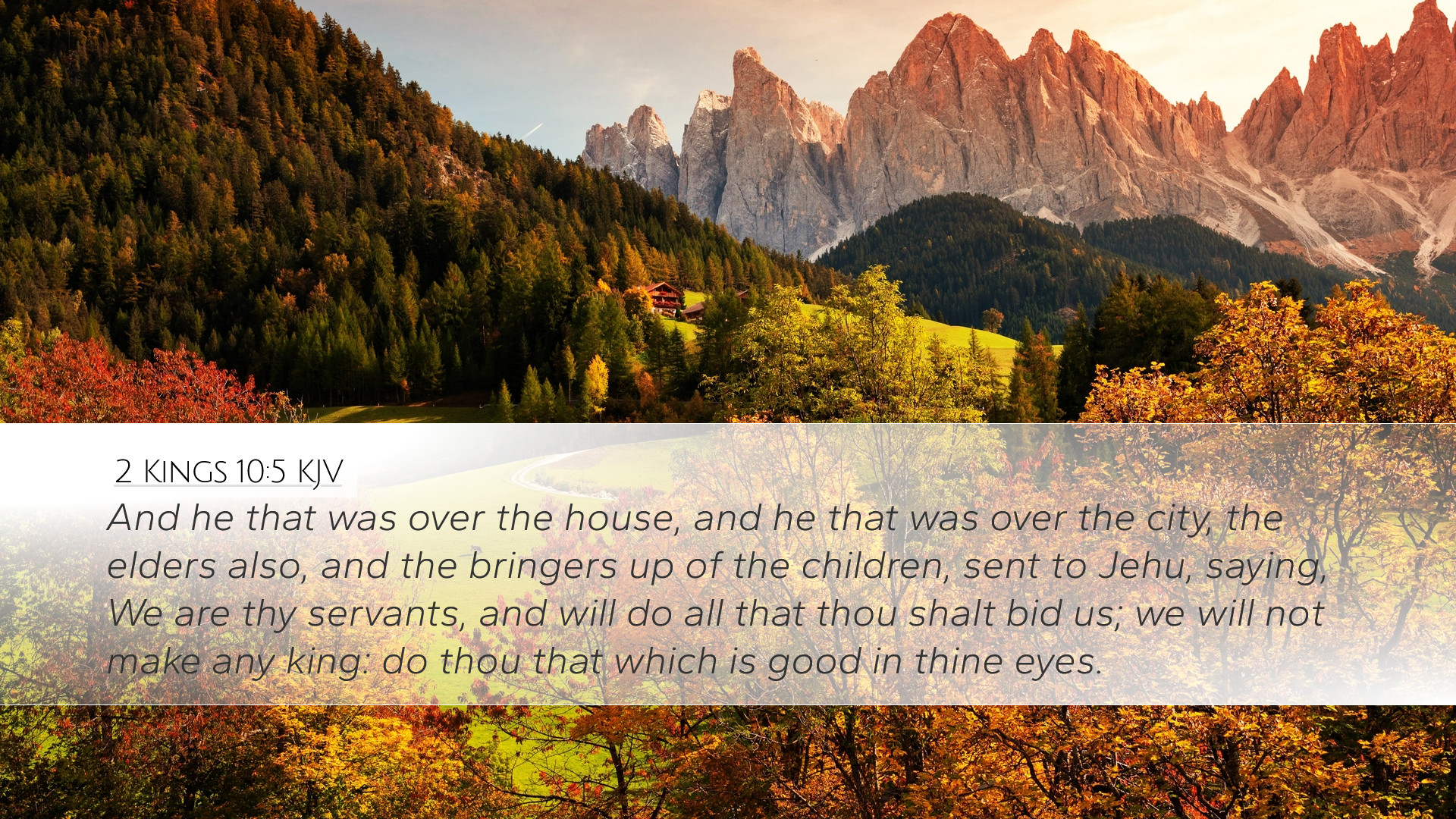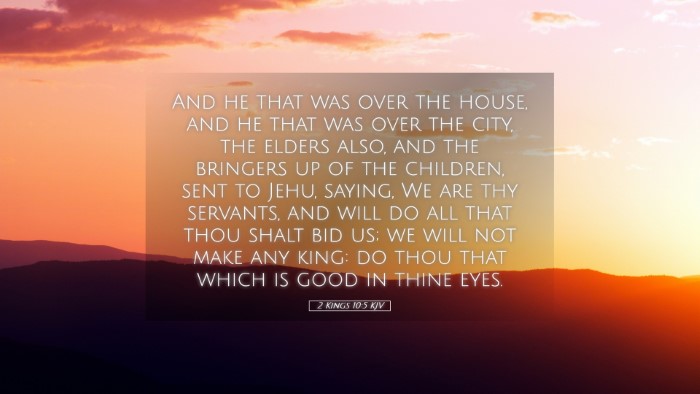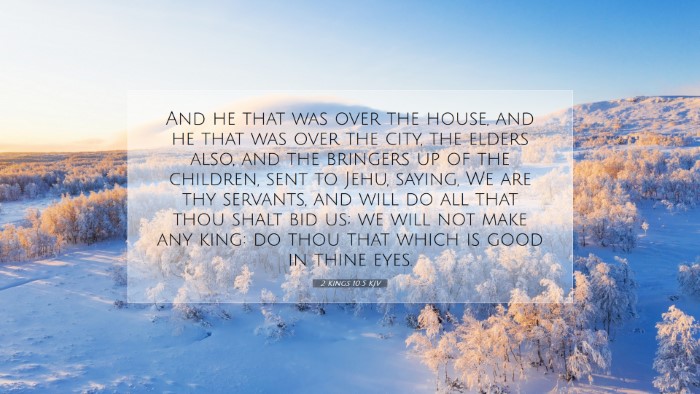Commentary on 2 Kings 10:5
Verse: "And he that was over the house, and he that was over the city, the elders also, and the bringers up of the children, sent to Jehu, saying, We are thy servants; and all that thou shalt bid us we will do; we will not make any king: do thou that which is good in thine eyes." (2 Kings 10:5 KJV)
Contextual Overview
The backdrop of 2 Kings 10 is the tumultuous period in Israel's history during the reign of Jehu. Jehu was anointed king of Israel, tasked with the divine mandate to extinguish the house of Ahab, a lineage marked by idolatry and moral failure. This verse reveals a pivotal moment where Israel's leadership, in the wake of Ahab's fall and the subsequent tension, recognizes Jehu’s authority and seeks allegiance.
Insights from Public Domain Commentaries
Matthew Henry's Commentary
Matthew Henry notes the desperation of the leaders of Samaria as they face the radical changes incited by Jehu. His analysis focuses on the political maneuvering and the surrender of power by the governors, city leaders, and elders. They acknowledge Jehu’s authority, indicating their willingness to support him. This moment underscores the shift from the previous regime's wickedness to a new order under Jehu, marked by a divine purpose.
- Leadership Recognition: Henry emphasizes that the leaders recognize their former allegiance to Ahab, which was founded on corruption and idolatry. Their submission to Jehu signals a critical turning point—a rejection of Baal worship and a return to covenant fidelity.
- Divine Providence: The author highlights the providential hand of God in orchestrating such transitions, reflecting the broader theme of God presiding over history and governance.
Albert Barnes' Notes
Albert Barnes further elaborates the psychological and societal implications of this verse. He suggests that the leaders' response is born out of fear and pragmatism rather than genuine devotion, reflecting the tumultuous political climate of the period.
- Plea for Stability: Barnes points out that the acknowledgment of Jehu’s authority was predicated on a desire for stability. The leaders appeal to Jehu for a continuation of order amidst chaos, indicating that political motivations often overshadow spiritual considerations.
- The Significance of 'Servants': He also delves into the choice of the term "servants," indicating their subservience and the expectations placed upon them to maintain loyalty, underscoring the importance of hierarchy and responsibility during this transitional phase.
Adam Clarke's Commentary
Adam Clarke highlights the moral implications of the leaders' capitulation to Jehu. He reflects on the societal ethos that allowed for such a rapid shift in allegiance, suggesting it reveals a deep-seated yearning for righteousness even amid past idolatry.
- Moral Responsibility: Clarke argues that despite their previous support for Ahab, the leaders are now seeking redemption through Jehu, showing a potential awakening of moral responsibility within the community.
- Collective Action: He notes that their collective action symbolizes a community grappling with the consequences of past choices and yearning for a return to godly leadership.
Theological Reflections
This verse serves as a profound illustration of leadership dynamics within theocratic governance. The leaders express submissiveness to Jehu, mirroring the relationship between divine authority and the moral landscape in which political leaders operate. Observations from Henry, Barnes, and Clarke invite theological reflection on the following:
- Human Fallibility: The transition from one leadership to another highlights the continuous cycle of human fallibility and the need for repentance.
- God's Sovereignty: The verse illustrates key elements of God's sovereignty over human affairs, reminding believers that even in times of moral decay, God raises leaders to fulfill His redemptive purposes.
- The Role of Community: The acknowledgment of collective responsibility among leaders challenges modern readers to consider how community dynamics play into spiritual and political leadership today.
Practical Implications for Today
For pastors, theologians, and students of the Word, this verse and its commentary provide key insights into contemporary leadership challenges. The themes of accountability, integrity, and divine purpose in leadership resonate with the current societal climate. Practical applications include:
- Encouragement of Righteous Leadership: Pastors are encouraged to teach and model integrity in leadership, reflecting the moral awakening seen in the leaders of Israel.
- Community Engagement: Leaders should recognize the importance of community input and the collective responsibility toward righteousness, fostering environments that encourage spiritual growth.
- Dependency on Divine Guidance: A constant reminder of the need for divine direction in leadership decisions, emphasizing prayerful discernment in the church and organizational leadership.
Conclusion
2 Kings 10:5 serves as a compelling reminder of the complexities of leadership and the ongoing struggle between good and evil in the world. Drawing from the insights of esteemed commentators like Matthew Henry, Albert Barnes, and Adam Clarke, we find both historical and theological foundations that challenge us to pursue godly leadership that is responsive to God’s sovereignty and the needs of the community.


